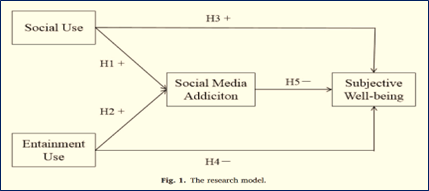Literature Review: Impact of Social Media Types and Addiction
Impact of Social Media Types and Addiction
Zhao (2021) compares the subjective well-being of social media addicted and non-addicted students through social media use types. Zhao focuses on the influence of different social media use types, and the relationship between social media addiction and subjective well-being. The research answers the question: Does the way a student uses social media affect their subjective well-being?
The study consists of qualitative and quantitative data collection across four categories: social use, entertainment use, social media addiction and subjective well-being.
Figure 1
Social Media Addiction and Subjective Well-Being Research Model

Zhao’s (2021) research model above charts the effects of social use and entertainment use on social media addiction and subjective well-being.
The four measures used in existing sources, regarding similar topics, utilized Likert scale questions. By using Likert scales, researchers were able to assign a numerical value to emotions and behaviours and range them from least to most. The numerical value and range provide the ability to measure a unidimensional variable (Merrigan et al., 2012). The questionnaire Zhao (2021) created was distributed through random sampling at a comprehensive university in Anhui Province, China, with nearly 30,000 students. Four hundred questionnaires were distributed, with 370 valid questionnaires obtained. The total sample included 162 boys (43.9%) and 208 girls (56.1%). The sample was then divided into 224 (60.5%) addicted and 146 (39.5%) non-addicted students. Addicted students were categorized by scoring three or more on at least six responses on the social media addiction scale (Zhao, 2021, p. 3).
The research done by Zhao’s (2021) study supports the interpretative claims that the type of social media use does affect students’ subjective well-being in different ways. The results of the total addicted and non-addicted students show that social use positively predicts the subjective well-being of college students; that is, social use can help them improve subjective well-being (Pang, 2018b). There are various reasons as to why and how social use improves subjective well-being, the reasons seem to focus on the positive enhancements of socialization in real-world behaviours and interactions. Zhao states that this study is “consistent with previous research (Błachnio et al., 2016; Ponnusamy et al., 2020), social media addiction harms college students’ subjective well-being, which is supported in the validation of all three groups” (Zhao, 2021, p. 6). The addictive tendencies caused by the overuse of social media are the reasoning to a decreased overall subjective well-being, producing “symptoms (i.e., salience, tolerance, mood mediation, relapse, withdrawal, and conflict) (Andreassen et al., 2012) which will have adverse effects on their mental health, learning and life, and then reduce their subjective well-being” (Zhao, 2021, p. 5).
Zhao’s (2021) comparative analysis and sources were used in the creation of the survey, interview questioning, and framework. Similar Likert scales were used as the four variable measurements mentioned by Zhao: social use, entertainment use, social media addiction and subjective well-being. These measurements provided participants with a variety of response options that were still controlled for consistent data collection and analysis. The data collected from this research study was compared to Zhao’s data and hypotheses conclusions. Numerical data were analyzed according to the sample Zhao provided to verify the validity of the current hypothesis on the prevalence social media addiction and the impact SMA has on the lives of young adults.

